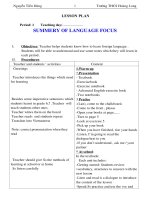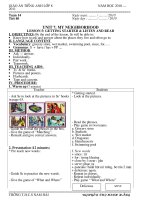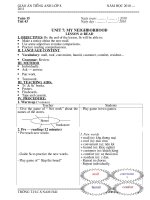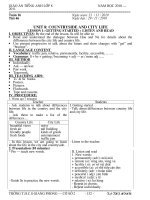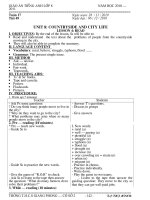GIAO AN TIENG ANH 8 TUAN 16 PPCT MOI NHAT THAI BINH
Bạn đang xem bản rút gọn của tài liệu. Xem và tải ngay bản đầy đủ của tài liệu tại đây (184.69 KB, 8 trang )
<span class='text_page_counter'>(1)</span><div class='page_container' data-page=1>
<b>Tuần 16</b>
<b>Tiết 46</b> <i>Ngày soạn: 21 / 11 / 2010Ngày dạy : 29 / 11 / 2010 </i>
<b>Unit 8: Countryside and city life </b>
<b>Lesson 1: Getting started + Listen and read </b>
<b>I. Objectives: By the end of the lesson, Ss will be able to:</b>
Read and understand the dialogue between Hoa and Na for details about the
differences between the city life and country life.
Use present progressive to talk about the future and show changes with “get” and
“become”.
<b>II. Language content </b>
<b>Vocabulary: traffic jam, relative, permanently, facility, accessible, </b>……
<b>Grammar: S + be + getting / becoming + adj – er / more adj </b>…..
<b>III. Method </b>
Individually.
Ask – answer.
Pair work.
Teamwork.
<b>III. Teaching aids: </b>
Ts’ & Ss’ books.
Posters.
Pictures.
Flashcards.
Tape and cassette.
<b>IV. Procedure:</b>
1. Warm up (7 minutes)
Teacher Students
- Ask students to talk about differences
between life in the country and the city
life.
- Ask them to make a list of the
differences….
- In this lesson, we are going to learn
about the life in the city and countryside.
I. Getting started
- Talk about differences between country life
and city life.
- Listen to the teacher.
<b>2. Presentation (10 minutes) </b>
* Pre – teach new words.
- Guide Ss to practice the new words.
II. Listen and read
1. New words:
+ permanently (adv): m·i m·i
+ remote (a): vïng s©u, vïng xa
+ facility ( n): c¬ së vËt chÊt
+ accessible (a): có thể tiếp cận đợc
+ definitely (adv ): hon ton
+ peaceful ( adj): yên bình
+ medical (adj): y tÕ
+ relative ( n): hä hµng
- Repeat in chorus.
- Repeat individually.
Country Life City Life
beautiful views
fresh air
friendly people
fresh foods
noisy
</div>
<span class='text_page_counter'>(2)</span><div class='page_container' data-page=2>
- Check the new words.
- Ask Ss to retell the use and the form of the
present progressive.
- Introduce the new use of the present
progressive.
- Ask Ss to look at the picture:
+ Where is it?
+ Do you live in the place as like it?
- Hoa and Lan are talking about their
weekend. Now please listen to the tape then
answer the question:
+ Where did Na go on the weekend?
+ Does Na like living in the country
permanently?
- Copy the new words.
- Play game “jumble words” in two teams.
2. Grammar:
<i>* Present progressive </i>
S + am/ is/ are + V_ing + ……….
- Show the changes with get and become
- Be getting/becoming + Adj- er / more adj
E.g: The buildings are getting more.
- Answer T’s questions.
- Listen to the teacher.
- Prepare for listening.
- Answer the guiding questions.
<b>3. Practice (18 minutes) </b>
- Ask Ss to look at the book and listen to the
tape again, then practice the dialogue with
the partners.
- Look at the book.
- Listen to the tape.
- Practice the dialogue in pairs.
- Some pairs practice loudly.
- Now, please read the following
information then stick if they are true or
false.
- Ask Ss to work in pairs to answer the question in
exercise 2.
11 <sub>2. a</sub> <sub>3. b</sub> <sub>4. c</sub>
5. d 11 <sub>7. e</sub> 11
a) Where has Na been?
b) How long was she there?
c) What is her opinion of the countryside?
d) Na says “There is nothing to do”. What
does she mean by this?
e) What are the some of the changes that
Hoa mentions?
- Read the statements then stick T or F.
a) Na went to the countryside for the
weekend. T
b) Kim Lien is a quiet and peaceful village.
T
c) Na didn’t enjoy her weekend in Kim
Lien village. F
d) There’s no electricity in there. F
e) Hoa prefers the city life. F
- Work in pairs.
- Play the game of “Lucky numbers” to
answer the questions:
a. Na has been to the countryside / Kim
Lien village
b. She was there for the weekend.
c. Her opinion of the countryside is it is
very quiet & peaceful and there is nothing
to do.
d. There are no movies, zoos, libraries …to
go.
</div>
<span class='text_page_counter'>(3)</span><div class='page_container' data-page=3>
<b>4. Production (7 minutes) </b>
- Ask Ss to work in four groups to discuss
about the question “Do you prefer the city
or the countryside? Why?
- Correct the mistakes if there are then give
the feedback.
- Work in four groups.
- Write on the posters.
- Some Ss read the answers loudly.
<b>5. Homework (3 minutes) </b>
Learn by heart the new words
Write a short passage about why they prefer the city or the country life.
<b>TuÇn 16</b>
<b>Tiết 47</b> <i>Ngày soạn: 24 / 11 / 2010Ngày d¹y : 01 / 12 / 2010 </i>
<b>Unit 8: Countryside and city life </b>
<b>Lesson 2: Speak + Language focus 3 </b>
<b>I. Objectives: By the end of the lesson, Ss will be able to:</b>
Practice with their partners, talking with them about changes of the town.
Use the present progressive tense to speak about the changes.
<b>II. Language content </b>
<b>Vocabulary: words related to country and city life.</b>
<b>Grammar: </b> The present progressive used to describe changes with “get” and
“become”.
<b>III. Method </b>
Ask – answer.
Pair work.
Teamwork.
<b>III. Teaching aids: </b>
Ts’ & Ss’ books.
Posters.
Pictures.
Flashcards.
<b>IV. Procedure:</b>
1. Warm up (7 minutes)
Teacher Students
- Give the game of “Net work”.
- Have Ps write as many adjectives as they
can on the board.
- Check and correct.
- Play the game in two teams.
- hot - noisy - dirty
- large - busy - tall
- beautiful - modern - clean
<b>2. Pre </b>–<b> speaking (10 minutes) </b>
* Present new language:
- Explain how to use present progressive to
talk about the changes.
- Give examples to illustrate.
E.g:
I. SPEAK
1. Grammar
- Present progressive to show the changes
S + is/ am/ are + getting/ becoming + adj
- Comparative: - short adj + er
</div>
<span class='text_page_counter'>(4)</span><div class='page_container' data-page=4>
+ The town is becoming busier.
+ The streets are getting cleaner.
- Use: Used to describe changes with “get”
or “become”.
<b>3. While </b>–<b> speaking (15 minutes) </b>
- Have Ps look at the two pictures and ask
them to show the differences between them.
- Ask Ps these questions:
? Find out five things in the pictures that
are different from each other.
? What are they?
+ Have Ps work in pair to talk about th
changes in the pictures
- Call some Ps to practice in front of the
class.
+ Ask them to practice talking about the
changes in their home town.
2. Work with a partner to talk about the
changes of the town
- The traffic is getting busier
- There are move tall buildings & houses
- The houses are getting more modern
- The town is becoming more beautiful
3. The changes in your home town
- The streets are getting larger
- The goods are becoming more expensive
<b>4. Post </b>–<b> speaking (10 minutes) </b>
- Ask Ss to look at the exercise 3 in page 78
in students’ books: Complete the sentences.
Use the verbs and adjectives in the boxes.
- Call some Ss to read their completed
sentences.
a) The boys are getting taller.
b) The old men ……….
c) We should go home. It ………….
d) The weather ………..
e) The students ………..
f) The school yard ………..
4. Exercise 3 (78)
- Look at the exercise in students’ books.
- Work in pairs to do the exercise.
- Some Ss read their answers.
b. The old men are getting weak.
c. We should go home. It is getting dark.
d. the weather is becoming cold.
e. The students are getting better.
f. The school yard is becoming cleaner.
<b>5. Homework (3 minutes) </b>
Learn by heart the new words
Write 5 sentences to describe the changes in the home town.
Prepare for Unit 8 – Lesson 3: Listen + L.G 1, 2.
get
</div>
<span class='text_page_counter'>(5)</span><div class='page_container' data-page=5>
<b>Tuần 16</b>
<b>Tiết 48</b> <i>Ngày soạn: 25 / 11 / 2010Ngày dạy : 03 / 12 / 2010 </i>
<b>Unit 8: Countryside and city life </b>
<b>Lesson 2: Speak + Language focus 3 </b>
<b>I. Objectives: By the end of the lesson, Ss will be able to:</b>
Practice listening to the tape and fill in the missing words.
Use the present continuous to talk about the future.
<b>II. Language content </b>
<b>Vocabulary: destination, departure, status, revise, arrival</b>…..
<b>Grammar: The present progressive used to talk about the future.</b>
<b>III. Method </b>
Ask – answer.
Individual.
Pair work.
Teamwork.
<b>III. Teaching aids: </b>
Ts’ & Ss’ books.
Tape and cassette.
Posters.
Pictures.
<b>IV. Procedure:</b>
1. Warm up (7 minutes)
Teacher Students
- Give the game of “Matching”: Prepare 8
cards with phrases on them. Write 8 verbs
on the board.
- Give the feedback and report the team
who win the game.
- Guide Ss to practice the phrases.
- Play game in two teams.
+ Look at the cards and the given verbs on
the board. Then write the cards with the
suitable verb.
Play the house
Do my aunt
Watch a meeting.
Go to man
Clean to violin lesson
Have table tennis
Phone my homework
Speak a program
- Practice the phrases in chorus.
- Practice in pairs.
- Make sentences with the phrases.
<b>2. Listening (18 minutes) </b>
* Pre – listening (5 minutes)
- Ask Ss to look at the pictures in page 74.
- Set the scene: Lan and Aunt Hang are
<i>talking to Lan on the phone. Please predict</i>
- Look at the pictures.
</div>
<span class='text_page_counter'>(6)</span><div class='page_container' data-page=6>
<i>to fill in the missing words.</i>
- Ask Ss to give their guessing words to
complete the dialogue.
- You are going to listen to the tape then
find out the words in the brackets.
* While – listening (10 minutes)
- Open the tape three times.
- Ask Ss to listen once more to check their
answers and give the feedback.
Lan: Hello.
Aunt Hang: Hello. Is (1) ……… Lan?
Lan: Yes. Who is (2) ………..?
Aunt Hang: (3) ……… Aunt Hang. How
are you?
Lan: I’m fine. (4) ……… are you phoning
(5) ………….?
Aunt Hang: Hue. I’m calling to tell you
Uncle Chi and I are (6) ………. to visit you
next (7) ………….
Lan: Great! When are you (8) ………?
Aunt Hang: On (9) ……….. We’re arriving
in Ha Noi in the (10) …… (11) ………..
Lan: OK. Do you want to (12) ………..
(13) ……….. mom?
Aunt Hang: Yes, please.
Lan: Hold n a moment and I’ll (14) ……
her.
* Post – listening (2 minutes)
- Call some pairs of Ss to practice the
dialogue.
- Give the guessing words.
- Prepare for listening.
- Listen to the tape then do exercise
individually.
- Give their answers.
- Listen to the tape once more then write
down the correct answers.
that
this
It’s
Where
from
coming
week
arriving
Thursday
late / afternoon
speak
my
get
- Some pairs practice loudly.
<b>3. Language focus 2 +3 (17 minutes) </b>
- Ask Ss to write the structure of present
progressive on board.
- Call one Ss to retell the use of the present
progressive.
- Ask Ss to read the sentences:
+ Uncle Chi and I are coming to visit you
next week.
+ We are playing tennis this afternoon.
+ Lan is having a meeting tomorrow.
? Are the sentences above present the
activities at present?
- The present progressive is also used to
present the activities in the future.
- Ask Ss to look at the exercise 2 page 78.
Nam: What are you doing tonight?
Bao: I (0) am playing table tennis.
- Call some Ss to read their answers and
give the feedback.
Uncle Thanh: Would you and Lan like to
go to the movies?
Hoa: Sorry, we can’t. We (1) .... homework.
- Write the structure of the present
progressive.
S + am / is / are + V-ing ………
- Write down.
- Work in pairs.
- Give their answers.
</div>
<span class='text_page_counter'>(7)</span><div class='page_container' data-page=7>
Mrs. Vui: Are you watching the seven
o’clock news?
Mr. Nhat: No, I (2) …… a program on
rainforests.
Hoa: I’m going to the beach on Sunday.
Lan: Lucky you! I (3) ….. to my violin
lesson.
Mrs. Thoa: Are you free on Sunday
afternoon?
Na: No, Mom and I (4) ……. the house.
Nga: Can you fix my computer on Friday
afternoon?
Mr. Lam: I’m afraid not. I (5) …….. a
meeting that afternoon.
- Call some pairs to practice the dialogues
in front of the class.
am watching
am going
are cleaning
am having
- Some pairs practice the dialogues loudly.
Exercise 1 (77)
- Now please look at the table of shipping
information.
- The first table is the table of the departure
ships. The second is the arrival ships. Now
please practice the dialogues a) and b) in
page 77.
- Ask Ss on the left hand to work in pairs to
talk about the ships: Good fortune, City of
Hue and Golden Trail, Ss on the right hand
talk about the ships: Speed of Light,
Diamond Eyes and Stars Above.
- Call some pairs to practice their dialogues
in front of the class.
- Correct the mistakes and give the
feedback.
- Look at the table and give the remark
about the information.
- Listen to the teacher then practice the
dialogues.
- Work in pairs following the Teacher’s
guiding.
- Some pairs practice loudly.
P1: Is the boat to Quy Nhon leaving at
11.30?
P2: Is that Good Fortune?
P1: That’s right.
P2: I’m very sorry. It’s been delayed.
P1: Oh no!
P2: Now, it’s leaving at 13.55
P1: Is the boat to Nha Trang leaving at
11.40?
P2: Is that City of Hue?
P1: That’s right.
P2: It’s leaving on time.
P1: Is the boat to Ho Chi Minh City leaving
at 11.30?
P2: Is that Golden Trail?
P1: That’s right.
</div>
<span class='text_page_counter'>(8)</span><div class='page_container' data-page=8>
P1: Oh no!
P2: Now, it’s leaving at 16.20
P1: Is the boat from Ho Chi Minh City
arriving at 10.40?
P2: Is that Speed of Light?
P1: That’s right.
P2: I’m very sorry. It’s been delayed.
P1: Oh no!
P2: Now, it’s arriving at 12.30
P1: Is the boat from Ca Mau arriving at
11.00?
P2: Are you talking about Diamond Eyes?
P1: Yes
P2: It’s arriving on time.
P1: Is the boat from Phu Quoc arriving at
12.00?
P2: Is that Stars Above?
P1: That’s right.
P2: I’m very sorry. It’s been delayed.
P1: Oh no!
P2: Now, it’s arriving at 18.15
<b>4. Homework (3 minutes) </b>
Learn by heart all the new words and structure.
Practice the dialogues.
</div>
<!--links-->


